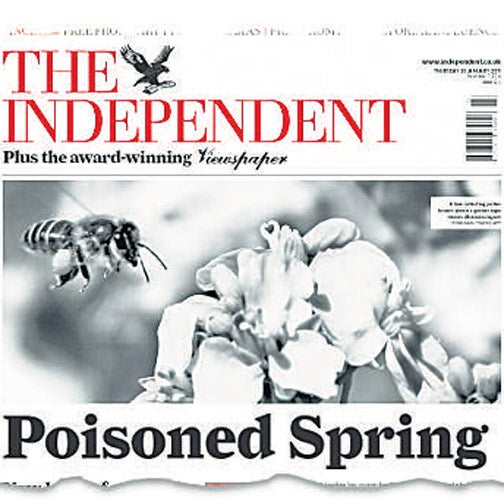Pesticide linked to bee deaths should be suspended, MPs told

Your support helps us to tell the story
From reproductive rights to climate change to Big Tech, The Independent is on the ground when the story is developing. Whether it's investigating the financials of Elon Musk's pro-Trump PAC or producing our latest documentary, 'The A Word', which shines a light on the American women fighting for reproductive rights, we know how important it is to parse out the facts from the messaging.
At such a critical moment in US history, we need reporters on the ground. Your donation allows us to keep sending journalists to speak to both sides of the story.
The Independent is trusted by Americans across the entire political spectrum. And unlike many other quality news outlets, we choose not to lock Americans out of our reporting and analysis with paywalls. We believe quality journalism should be available to everyone, paid for by those who can afford it.
Your support makes all the difference.A new generation of pesticides is implicated in the widespread deaths of bees and other pollinators and should be suspended in Britain while the Government reviews new scientific evidence about their effects, MPs were told yesterday.
Neonicotinoid pesticides are linked by "a growing weight of science" to insect losses, and the assessment regimes for them are inadequate, the Labour MP Martin Caton told the House of Commons.
Mr Caton, MP for Gower, said in an adjournment debate that "alarm bells should be ringing" about neonicotinoids, which are "systemic" insecticides – that is, they are present in every part of treated plants, including the pollen and nectar which bees and other pollinators regularly gather. At the moment, the Government's position is that the compounds are safe when used properly, and there are no restrictions on their UK use – even though they have been banned, in varying degrees, in other countries.
Last week The Independent highlighted new research from the US suggesting that neonicotinoids make honey bees far more vulnerable to diseases, even at doses so tiny that they cannot subsequently be detected.
Mr Caton told MPs that several pieces of fresh research had emerged "which tie the use of neonicotionods into environmental damage to honeybees and wild pollinators". Before that, he said, the invertebrate conservation charity Buglife had produced a review of 100 scientific studies and papers on the subject highlighting the concern.
On the basis of their findings Buglife had called on the Government to reconsider the position of neonicotinoids, and Lord Henley, a minister at the Department for Environment, Food and Rural Affairs (Defra), had replied that both the Advisory Committee on Pesticides (ACP) and the Chemicals Regulation Directorate (CRD) had reviewed the Buglife study, although he "did not answer the main thrust of the report".
In fact, Mr Caton told MPs, the ACP had not reviewed the study, and the CRD review of it was not finished. "But we know that Defra, without a completed review of the report, decided not to accept [Buglife's] interpretation of the science, and continued to maintain that we have a robust system of assessing risks from pesticides in the UK," he said. He called on the Food and Farming minister, Jim Paice, who was responding for the Government, to suspend use of neonicotinoids "until the best scientific evidence gives them the all-clear".
The Green Party MP, Caroline Lucas, said Defra "seems extraordinarily complacent about the health of bees". She told MPs: "As long ago as 2005, I asked the European Commission to comment on a Defra cut that saw a halving of seasonal bee inspectors. Given that beekeeping contributes over £165m a year to the UK's economy in direct terms, and has an unquantifiable value in terms of the health of our ecological systems, this complacency seems very misplaced."
Mr Paice rejected the charge of complacency, saying the Government took the issue of bee health very seriously, and that he himself had raised it in the House as long ago as 1997. He said the Buglife report had been fully reviewed and advice taken from government agencies, with the conclusion that, as an amalgamation of available evidence, the report did not "raise new issues".
When Mr Caton intervened to say that a review had not, in fact, been fully completed, Mr Paice said: "This is news to me."
He promised to respond in writing to Mr Caton's concerns.
Join our commenting forum
Join thought-provoking conversations, follow other Independent readers and see their replies
Comments